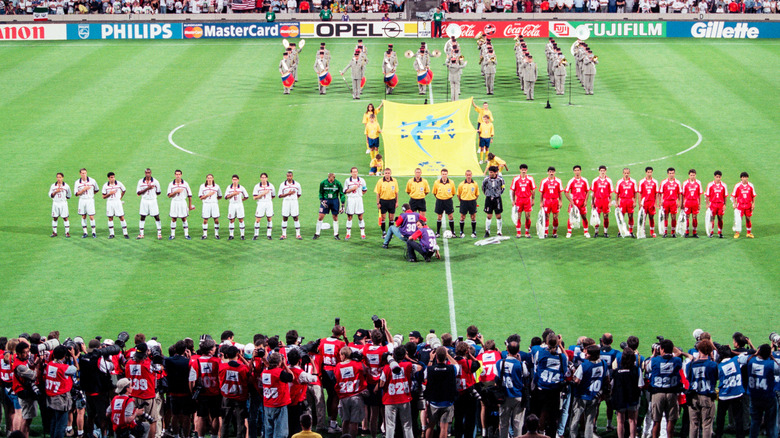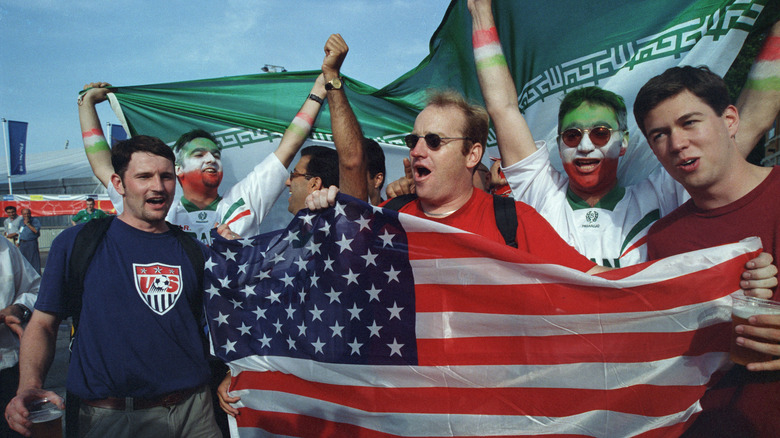The First World Cup Match Between The US And Iran Was Marked By Political Tension
Tense soccer matches often lead to drunken punch-ups, but few lead to major security concerns that require armed police. In 1998, however, when the U.S. first played Iran in a World Cup game, political tensions led to a nail-biting event, that some feared would end in tragedy. The year the game took place happened to be the eve of the 20th anniversary of the 1979 Tehran hostage crisis, in which a group of U.S. citizens were held captive at their own embassy in Iran for 444 days.
In perhaps the most tightly-controlled match of all time, 150 armed police were sent to guard the stadium, and police escorts and plainclothes officers were supplied by the authorities to keep players safe (via CNN). Rumors circulated that U.S. players were being targeted by extremist groups, and many feared a potential terrorist attack.
No such attack transpired, however, and although the U.S. would go on to lose their match, the heartwarming displays of peace and friendship between the two sides made it a clear victory for all involved.
Tensions reach a boiling point
Off the pitch, the political rhetoric spewed by politicians and clerics at the time was as fierce as it is today. Iran and the U.S. have been political enemies since the 1979 Iranian revolution during which the U.S.-backed Shah of Iran was overthrown by the Islamic revolutionary guard, led by Ayatollah Khomeini. Relations between the two powers only grew worse following American support for Iraq in the Iran-Iraq war (via the CFR). Throw in Iran's terrible human rights record and historic U.S. sanctions into the mix and you have a perfect political storm. The U.S. became the "great satan," and Iran a feared backer of terrorism.
By 1998, the two powers had not been on speaking terms for 20 years, so the meeting of their respective soccer teams in the group stages of the world cup was an enormous event.
While the U.S. government took pains to remain neutral on the matter, the Iranian government put huge pressure on their own team to perform well in the game (via The Washington Post). At half-time, the Iranian team had their passports confiscated, and were told they would not get them back if they did not win (via The Daily Mail).
Roses of peace
When the Iranian players got to the pitch, however, they made a real effort to combat the climate of incendiary politics back home. The Iranian manager, Jalal Talebi, who hailed from Iran but lived in California, played the peacemaker (via the BBC). He and his team decided to give the American players white roses, a symbolic gesture of peace. In a display of great sportsmanship, the two teams also arranged a photo shoot that saw them linking arms and smiling together.
Although violence did erupt in the stadium, the tensions that broke out were between Iranian fans themselves. In the days leading up to the event, anti-government protests in Iran intensified. According to the Washington Post, at the match itself, pro and anti-regime fans got into a number of brawls. At the time, the Iranian Mujahideen-e-Khalq (MeK), an anti-regime organization, was particularly active in France where the world cup was being held (via CNN). MeK supporters waved the pre-revolutionary flag, and one group in the crowd held a "Death to Khatami" (the then-Iranian president) banner aloft for all to see.
The eventual Iranian 2-1 victory led to dancing in the streets in Iran, and then as today, some women took the opportunity to remove their headscarves.


